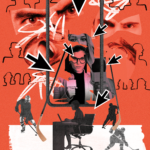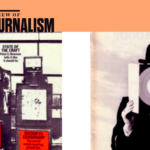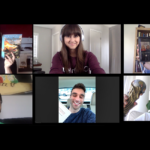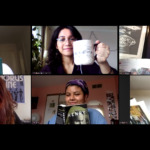What the Review masthead is reading, watching, and listening to during the pandemic: Part 2
Emily Latimer is a senior digital editor at the Ryerson Review of Journalism. She has previously worked for CBC Nova Scotia.
When I’m feeling literally any type of emotion, my first stop is a scroll through the archives of This American Life. I am obsessed with Ira Glass—especially when he’s recording the show barefoot, in his closet, wearing a suit. With nearly 700 episodes aired since 1995, these journalists know how to tell an epic radio story on nearly any topic. I have go-tos for whichever mood I’m channeling. In these trying times, if you need a quick laugh, listen to “Fiasco!” which was first broadcast more than 20 years ago. In act one, Glass and author Jack Hitt explore how mishap charts toward disaster and can eventually end up in utter chaos.
If you’re feeling lonely, there are episodes for that. In “Fermi’s Paradox,” three people wonder: “Are We Alone?” Producer David Kestenbaum is sad that we are possibly on our own in the universe. A lonesome couple seeks counselling to fix their marriage. And a nine-year-old girl asks her father life’s big unanswerable questions, including my personal favourite: “Time. Why? Explain.”
Bonus episodes, because I just can’t stop myself: “24 Hours at the Golden Apple,” in which reporters take shifts to document life at a Chicago diner. In “House on Loon Lake,” a man returns to the story of a mysterious abandoned house that’s haunted him since he was a boy growing up in the 1970s. A ticking clock creates tension in “129 Cars,” as scrappy car salesmen at a Long Island Jeep dealership try to meet their monthly sales goal. And finally, “No Coincidence, No Story!” explores chance, fate, destiny, and all that good stuff.
Megan Seligman is a senior print editor at the Review. She has previously written for The Kit.
With the abundance of time I am now spending at home, I’ve allowed myself the luxury of fully indulging in recreational research. I know, it sounds rather nerdy, but I have a general curiosity for criminal cases. I watch old episodes of The Fifth Estate, like the 2010 segment about Ashley Smith, who died in solitary confinement as prison guards witnessed. I also just re-read a fascinating 1946 feature from Maclean’s about the post-WWII crime wave in Canada.
I have always been an avid reader. When I started my post-secondary education, I vowed academic articles would not be the only thing I’d read, in an effort to separate reading for pleasure and reading for school. For that reason, I’ve started Kevin Donovan’s book, The Billionaire Murders, about the investigation into the deaths of Barry and Honey Sherman. It would be easy to consume an abundance of COVID-19 reporting. So I have actively tried to limit that for my mental wellbeing. Self-isolation has given me the chance to do something I have not had the opportunity to do in years: read for enjoyment before bed each night, away from any technology.
Many people may find my chosen reading strange, but I find comfort in the distraction it provides. In these uncertain times, I’m allowing my curiosity toward the justice system to run wild.
Ashley Fraser is the chief podcast editor at the Review. She also works at CBC Radio’s Cross Country Checkup. She previously worked with Day 6 and CBC’s London, U.K. Bureau. She is a 2020 Joan Donaldson CBC News Scholar.
When I was little, I was horrified by the movie Cast Away. I thought being trapped on a deserted island like Tom Hanks’ character was the ultimate evil. Now, I take comfort in alone time, especially when I’m in the fortunate position of being able to appreciate even more great journalism.
For me, there’s no better listening than BBC Radio 4’s Desert Island Discs—a program that has asked the same question to its interviewees since 1942: If you were cast away on a desert island, what eight songs would you bring with you? (In recent years, the hosts have also asked guests which book and luxury item they would bring.) The show feels fitting during the pandemic. It’s almost like we are each trapped on our own islands. But there’s such an intimate quality in learning about a well-known person’s listening habits. Episodes I recommend: “Lily Allen,” “Malcolm Gladwell,” “Tom Hanks,” and I couldn’t forget my childhood crush, “Daniel Radcliffe.”
Some of my daily listening habits have not changed. I still tune into BBC Radio 4’s The Media Show. Amol Rajan’s veracious interview style energizes me. Last week’s episode covered how radio presenters have become a source of comfort as listener numbers soar in both Canada and the U.K. I’ve certainly been keeping up to date with the latest news and current affairs through CBC’s Front Burner podcast with Jayme Poisson, and The Current radio show with Matt Galloway, whose producers are delivering double the amount of content during this uncertain, indefinite period.
Randeep Mandar is co-chief of research at the Review.
When the news cycle gets a little too hectic for me, I tend to listen to podcasts. My favourite podcast is Stuff You Missed in History Class. I’ve pretty much exhausted their archives. They recently brought back an episode from 2014, all about the Spanish Flu of 1918—not exactly uplifting, but it has given me some comfort during the pandemic.
I also really like listening to Dressed: The History of Fashion because I love hearing about the way our clothes define decades, political eras, and our identities. Then, there’s Stuff They Don’t Want You to Know which is about conspiracies, cultural phenomena, and the sordid goings-on in our world right now. Government corruption is a favourite subject of mine, which is admittedly pretty cynical, but I cherish learning about systemic issues that maybe one day we can fix.
Katrya Bolger is the editor-in-chief of the Review. She has previously worked for The Globe and Mail, the Bangkok Post, and Maisonneuve.
In times of crisis, I need my news to let me feel the gravity of what’s going on, while giving me the perspective to feel empowered about it. Throughout the pandemic, I have returned to Vox’s explanatory journalism for just that. The American news website is known for presenting complex stories in an accessible way. This genre of journalism lets you enter the story at any stage of its development, something I appreciate whenever I need a break from the deluge of COVID-19 coverage. Some notable Vox explainers include one on the variance in death rates between different countries and another on how to do grocery shopping during a pandemic.
I also enjoy Vox’s YouTube channel, which has several short videos on COVID-19. These slickly-designed segments typically feature a Vox journalist or expert talking, humbly framed on-screen within their home space. Some remarkable videos include “Why fighting the coronavirus depends on you” and “How soap kills coronavirus.” They answer your questions as they naturally arise, while inspiring a sense of what can be done to feel less helpless. The video “Being our best selves during coronavirus” features clips of people around the world engaged in acts of solidarity, creativity, and resilience in the time of physical distancing. This type of journalism is essential to nurturing my humanity. More than ever, I understand my need to maintain a balanced news diet, which can be unavoidably dire, but also practical and uplifting. Vox stirs up all these ingredients into short, digestible journalism that never fails to inform.
Hannah Alberga is a senior digital editor at the Review. She has worked with The New York Times, CBC’s daily news podcast Front Burner, the Toronto Star, and This Magazine.
In times of uncertainty, I turn to food, and food writing. My safe haven is “Tables for Two,” Hannah Goldfield’s food column in The New Yorker. When I open my mailbox to the delight of a new copy, instantly, I flip to her most recent review. There is something satisfying about indulging in details of restaurants I will never eat in, located in a city I don’t live in. The distance is the allure.
During the era of COVID-19 and the absence of eating-out, this desire has only intensified. In the chaos of New York City dining rooms closing, Goldfield’s column has evolved, detailing the D.I.Y. experience of ordering in raw rib eyes, paired with a restaurant’s cooking instructions. “But each meal felt like a distress signal from a marooned ship,” writes Goldfield of her efforts to re-create an authentic New York culinary experience from home. Midnight-blue-banquette dining rooms and foie-gras on Park Avenue are no more. In an abandoned city, Goldfield’s words are like fiction.
I find comfort in sharing the experience of home cooking with Goldfield. Her meals may be more lavish than mine, but, we are all in the same boat—or in this case, the same kitchen.








